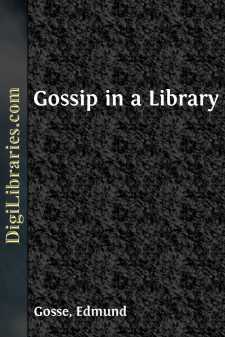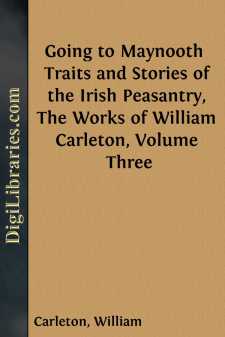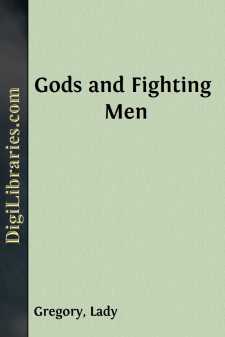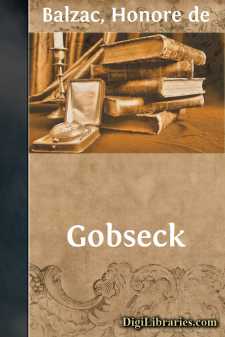Literary Collections
- American 84
- Ancient, Classical & Medieval 14
- Asian 1
- Australian & Oceanian 1
- Canadian 55
- Continental European 121
- English, Irish, Scottish, Welsh 179
- Essays 160
- General 24
- Letters 46
- Middle Eastern 1
Literary Collections Books
Sort by:
by:
Edmund Gosse
CAMDEN'S "BRITANNIA" BRITAIN: or a chorographical description of the most flourishingKingdomes, England, Scotland and Ireland, and the Ilands adioyning;out of the depth of Antiquitie: beautified with Mappes of the severallShires of England; Written first in Latine by William Camden,Clarenceux K. of A. Translated newly into English by Philémon Holland.Londini, Impensis Georgii Bishop &...
more...
by:
William Carleton
GOING TO MAYNOOTH. Young Denis O'Shaughnessy was old Denis's son; and old Denis, like many great men before him, was the son of his father and mother in particular, and a long line of respectable ancestors in general. He was, moreover, a great historian, a perplexing controversialist, deeply read in Dr. Gallagher and Pastorini, and equally profound in the history of Harry the Eighth, and...
more...
by:
Lady Gregory
CHAPTER I. THE FIGHT WITH THE FIRBOLGS It was in a mist the Tuatha de Danaan, the people of the gods of Dana, or as some called them, the Men of Dea, came through the air and the high air to Ireland. It was from the north they came; and in the place they came from they had four cities, where they fought their battle for learning: great Falias, and shining Gorias, and Finias, and rich Murias that lay to...
more...
CHAPTER ONE Philip Weyman's buoyancy of heart was in face of the fact that he had but recently looked upon Radisson's unpleasant death, and that he was still in a country where the water flowed north. He laughed and he sang. His heart bubbled over with cheer. He talked to himself frankly and without embarrassment, asked himself questions, answered them, discussed the beauties of nature and...
more...
by:
Honore de Balzac
GOBSECK It was one o'clock in the morning, during the winter of 1829-30, but in the Vicomtesse de Grandlieu's salon two persons stayed on who did not belong to her family circle. A young and good-looking man heard the clock strike, and took his leave. When the courtyard echoed with the sound of a departing carriage, the Vicomtesse looked up, saw that no one was present save her brother and a...
more...
by:
Walter Pater
[234] IT was on the afternoon of the Feast of Pentecost that news of the death of Charles the Ninth went abroad promptly. To his successor the day became a sweet one, to be noted unmistakably by various pious and other observances; and it was on a Whit-Sunday afternoon that curious Parisians had the opportunity of listening to one who, as if with some intentional new version of the sacred event then...
more...
by:
Various
INTRODUCTORY. This volume speaks so well for itself that it does not need many words of preface to commend it to a wide circle of readers. Its rich and varied contents, however, become far more interesting when interpreted by the motive that won them from their authors; and when the kindly feeling that offered them so freely is known, these gifts, like the pearls of a rosary, will be prized not only...
more...
by:
Helen Clergue
CHAPTER 1. GEORGE SELWYN—HIS LIFE, HIS FRIENDS, AND HIS AGE During the latter half of the eighteenth century no man had more friends in the select society which comprised those who were of the first importance in English politics, fashion, or sport, than George Selwyn. In one particular he was regarded as supreme and unapproachable; he was the humourist of his time. His ban mots were collected and...
more...
CHAPTER I The Irish police barrack is invariably clean, occasionally picturesque, but it is never comfortable. The living-room, in which the men spend their spare time, is furnished with rigid simplicity. There is a table, sometimes two tables, but they have iron legs. There are benches to sit on, very narrow, and these also have iron legs. Iron is, of course, harder than wood. Men who are forced to...
more...
by:
Honore de Balzac
GAUDISSART II. To know how to sell, to be able to sell, and to sell. People generally do not suspect how much of the stateliness of Paris is due to these three aspects of the same problem. The brilliant display of shops as rich as the salons of the noblesse before 1789; the splendors of cafes which eclipse, and easily eclipse, the Versailles of our day; the shop-window illusions, new every morning,...
more...











